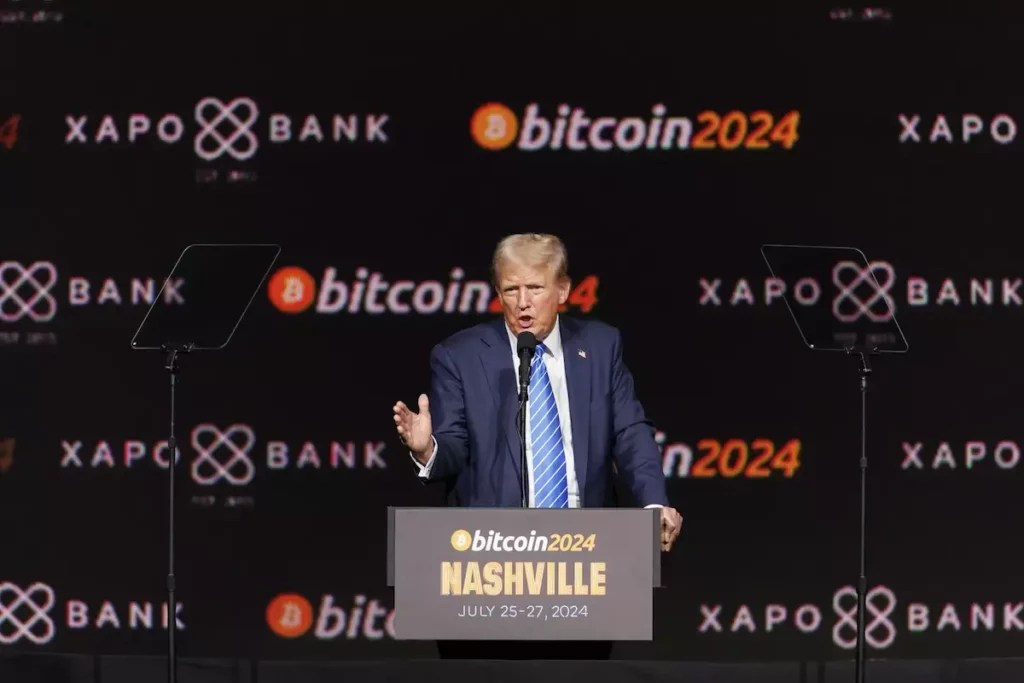The political landscape significantly influences various sectors, particularly in areas defined by innovation, such as Web3 and gaming technologies. Donald Trump’s previous office tenure was marked by fluctuating attitudes toward cryptocurrencies, reflecting a complex relationship between traditional governance and modern economic paradigms. Currently, as the prospect of a second Trump presidency looms, the Web3 gaming narrative may take on new dimensions based on regulatory transformations poised to affect both developers and consumers alike.
The Evolution of Trump’s Stance on Cryptocurrencies
In 2021, Donald Trump’s comments regarding cryptocurrencies were anything but favorable. He famously labeled Bitcoin as a “scam,” voicing concerns over its potential disruption of the United States dollar. Such disparaging remarks drew immediate skepticism regarding the viability of digital currencies and the burgeoning blockchain ecosystem. However, as time unfolded, Trump’s views have morphed towards a more favorable position, particularly with the increasing global acceptance of blockchain technologies and digital assets.
This shift signifies a burgeoning alignment with the trends that are reshaping frameworks around digital currencies. If Trump assumes the presidency again, a more crypto-enthusiastic approach could become institutionalized, creating a conducive environment for Web3 gaming. Implementing policies that encourage rather than stifle blockchain innovation could potentially define a new regulatory narrative in the United States.
Web3 gaming, characterized by decentralized platforms and tokenized economies, thrives on regulatory clarity. The absence of definitive guidelines can stifle innovation, deter investment, and lead to a chilling effect on market participants. Should the Trump administration adopt a more crypto-friendly stance, the implications for developers and gamers could be profound. By easing restrictions, developers could innovate without the looming fear of sudden regulatory crackdowns, offering players immersive experiences backed by genuine digital ownership.
Regulatory frameworks that foster innovation in this space will also facilitate smoother token issuance processes, placing less burden on startups focused on incorporating blockchain into gaming. This would effectively create a freer environment for trade and engagement within digital economies, driving player interest and participation.
Impacts on Investment and Market Growth
Investment in blockchain gaming has shown tremendous potential, yet it often remains stifled in environments of regulatory ambiguity. During Trump’s first term, the cryptocurrency market experienced cycles of meteoric growth followed by significant corrections. The lesson learned is that a supportive political and regulatory landscape can contribute to sustained market momentum.
If Trump successfully garners support for Web3 gaming, expect an influx of venture capital investments that propel further innovations within the ecosystem. A robust capital influx could stimulate the launch of advanced gaming platforms that merge traditional and decentralized gaming, potentially creating richer, more rewarding experiences for users.
Furthermore, Trump’s antagonism towards SEC Chair Gary Gensler indicates a desire to overhaul current regulatory environments surrounding cryptocurrencies. By replacing Gensler with a more crypto-friendly figure, Trump’s administration could facilitate a significant watershed moment for Web3 gaming. Fewer regulatory hurdles, especially in token trading and economic frameworks, may attract traditional investors wary of regulatory backlash.
The influence of U.S. policy can have widespread ramifications. Countries often look to U.S. regulations when shaping their approaches to emerging technologies like blockchain and cryptocurrency. Should Trump’s administration move towards a comprehensive policy framework accommodating digital assets, other nations might follow suit, creating a domino effect that fosters international cooperation in the realm of Web3 gaming.
A robust crypto policy in the U.S. could position it as a leader in digital innovation, paving the way for international collaborations and projects that unify the gaming and blockchain sectors globally. Conversely, conflicting regulatory policies could lead to tensions and fragmentation, hampering the potential synergy vital for nurturing a cohesive global gaming community.
Should Donald Trump return to the Oval Office, the trajectory for Web3 gaming is poised for transformative changes. The potential for a more supportive regulatory environment would not only invigorate domestic innovation but could also catalyze international partnerships. As the crypto landscape evolves, regulatory clarity will be crucial for the sustained growth of Web3 gaming and the broader blockchain economy.
In this light, Trump’s potential presidency might usher in a unique era of digital investment and innovation, steering Web3 gaming towards mainstream acceptance and beyond. The challenges remain, but the opportunities for growth and collaboration in the emerging digital economy are abundant, provided the conditions are right for developers and users to thrive. Ultimately, this new political climate could redefine the future of gaming in the digital age.

















Leave a Reply